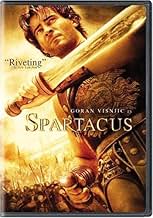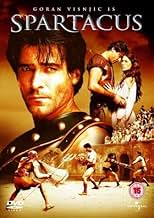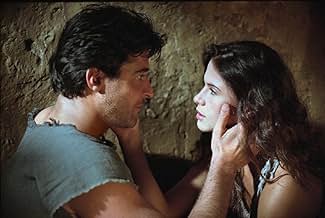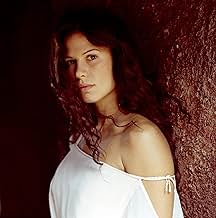NOTE IMDb
6,6/10
5,9 k
MA NOTE
Ajouter une intrigue dans votre langueAfter he is bought by the owner of a Roman gladiator school and trained as a gladiator, a slave leads a rebellion of slaves and gladiators into revolt against Rome.After he is bought by the owner of a Roman gladiator school and trained as a gladiator, a slave leads a rebellion of slaves and gladiators into revolt against Rome.After he is bought by the owner of a Roman gladiator school and trained as a gladiator, a slave leads a rebellion of slaves and gladiators into revolt against Rome.
- Nommé pour 1 Primetime Emmy
- 1 victoire et 7 nominations au total
Parcourir les épisodes
Avis à la une
The TV miniseries opens in Gaul 72 B.C. where the Romans put an end to Varinia's world making her a slave
Meanwhile Spartacus (Goran Visnjic) is free from the hell of the gold mines of Egypt to be trained as gladiator in the establishment of Lentulus Batiatus (Ian McNeice).
Most of "Spartacus" contains many of the miniseries' best moments The operation of the gladiatorial school and its training program is impressive and expressive; the apprentice gladiators are treated like special animals, tutored to perform in the arena as spectator-sport-killers, and occasionally rewarded with a woman in their cells
In this degrading manner Spartacus meets Varinia (Rhona Mitra) and it is his love for her and his hatred for his captors that brings about his decision to escape and lead revolt
Particularly effective is the scene in which Marcus Crassus (Angus Macfadyen) and his bored entourage visit the establishment and request for a private showing at its best of a pair of Thracians Crassus wanted to see courage, passion, and above all finality
Spartacus is matched with the African Draba in a fight to the death, but Draba (maybe rather than live as a beast) chooses to die as a man, attacking his spectators
The scene summarizes the iniquity of the situation, the cruelty of bondage, and the subsequent uprising of gladiators in Capua becomes a triumph easy to understand
Director Robert Donrhelm did a decent job, carrying the grandeur and the decay of ancient Rome
Most of "Spartacus" contains many of the miniseries' best moments The operation of the gladiatorial school and its training program is impressive and expressive; the apprentice gladiators are treated like special animals, tutored to perform in the arena as spectator-sport-killers, and occasionally rewarded with a woman in their cells
In this degrading manner Spartacus meets Varinia (Rhona Mitra) and it is his love for her and his hatred for his captors that brings about his decision to escape and lead revolt
Particularly effective is the scene in which Marcus Crassus (Angus Macfadyen) and his bored entourage visit the establishment and request for a private showing at its best of a pair of Thracians Crassus wanted to see courage, passion, and above all finality
Spartacus is matched with the African Draba in a fight to the death, but Draba (maybe rather than live as a beast) chooses to die as a man, attacking his spectators
The scene summarizes the iniquity of the situation, the cruelty of bondage, and the subsequent uprising of gladiators in Capua becomes a triumph easy to understand
Director Robert Donrhelm did a decent job, carrying the grandeur and the decay of ancient Rome
There's some confusion about this Spartacus miniseries and the 1960 epic movie Spartacus. The stories are very similar because they both use the Howard Fast novel as a basis. The Kirk Douglas movie had another mission though as it was one of a group of movies made to regain the public's interest in the cinema with lavish spectacle. The scale of its production is much higher than the miniseries. What the miniseries has going for it is more historical accuracy; the gladiator/rebel army marched up Italy, got to the Alps and changed its mind (very puzzling), marched down to Italy's toe hoping to escape by boat but was foiled and was trapped for a time. They broke out only to quarrel amongst themselves and break up into at least two groups. This proved their undoing as the Romans first massacred the smaller group of Gauls and then defeated Spartacus in turn. Spartacus' body was never identified, but many were crucified along the road all the way to Rome. Spartacus and his army made the Romans pay in much blood and defeat leading up to his and their ultimate defeat, though, requiring 15 or 16 legions to chase them down. Spartacus is a favorite hero of the Communists, BTW, being the working stiff rising up against the ruling class, etc...
The 1960 epic is short on accuracy, instead showing the rebel army defeating the garrison of Rome and another legion or 3 along the way to Brundusium, only to turn back and get overwhelmed by multiple Roman armies. It was a closer match to the actual scale of events, as the rebels numbered around 90-100,000. But they both have the same love story tacked on along with treachery in the Roman Senate by ahistorical Roman Senators, and a Crassus obsessed with possessing the strength of Spartacus by possesing his woman.
The 1960 remains my favorite version simply because its a well-done big movie (I wouldn't want to be the one to reprise Olivier's Crassus!)although it was good to see a more accurate portrayal of the course of events shown in the miniseries. The acting was pretty good, with Spartacus' Visnjic a good choice for the title role.
The 1960 epic is short on accuracy, instead showing the rebel army defeating the garrison of Rome and another legion or 3 along the way to Brundusium, only to turn back and get overwhelmed by multiple Roman armies. It was a closer match to the actual scale of events, as the rebels numbered around 90-100,000. But they both have the same love story tacked on along with treachery in the Roman Senate by ahistorical Roman Senators, and a Crassus obsessed with possessing the strength of Spartacus by possesing his woman.
The 1960 remains my favorite version simply because its a well-done big movie (I wouldn't want to be the one to reprise Olivier's Crassus!)although it was good to see a more accurate portrayal of the course of events shown in the miniseries. The acting was pretty good, with Spartacus' Visnjic a good choice for the title role.
The novel by Howard Fast deservedly works as a source for the story of Spartacus on the screen. However, it got considerably condensed in the 1960 classic Kubrick/Douglas production due to some specific limitations/requirements in the Hollywood of that time. This resulted in a fabulous motion picture, a cult Roman epic, the last great production of the period; yet, that is the movie which, for more than half a century, has stood on its own as a more independent production rather than a good novel adaptation. Therefore, the idea to make something more faithful to Fast's bestseller occurred reasonable after all these years when Ridley Scott's GLADIATOR marked a new rise of ancient epics. Robert Dornhelm's SPARTACUS is no remake, which makes all comparisons fruitless but its great challenge of adapting the novel to the modern expectations leaves many factors open for analysis. Does it succeed in that respect? Does it make us keen on the novel?
Dornhelm's interpretation of the story, being merely a TV production, appears to surprise both the novel buffs and the epic freaks. SPARTACUS succeeds at two major levels.
First, this production maintains the core idea of what the entire story is about. Having read Fast's novel, most people agree that the content of the movie strongly resembles the ideals and events therein incorporated. Our attention is focused on various personalities, various lives that meet at one significant moment: their mutual fight for freedom. The slaves (no human rank within the Roman society) are at the core, the slaves are the 'heroes.' Therefore, at the very beginning when Varinia and Spartacus are equally introduced to us, we feel the very spirit that is so unique in the novel: human stories, simple stories with no king, no hero. That ideal is, of course, contrasted with the Roman world, the world of corruption, greed and self-admiration. The world of hierarchy vs the world of equality. Consider the Roman leaders talking of sunrises vs sunsets. While the world of slaves represents many fights but one goal, the world of Romans represents individual ends and means justified. The events that shook the politicians and ambitious masters reflected upon at the Villa Salaria in Fast's novel (an important location for the novel not mentioned here) truly contribute to the spirit of the entire theme. The faithfulness to the novel is expressed in the development of characters, including Spartacus and certain aspects in scenes like the 'soul' blowing between Varinia and Spartacus, the true reason for the revolt in Batiatus' school at Capua, the ill ambitions of 'noble' Marcus Crassus, finally, the rescue of Varinia and the baby. And that beautifully addresses the novel buffs.
Second, unlike the novel built upon flashbacks (beginning with the actual crucifixions of slaves and young adventure seekers' journey for Capua), the linear content in Dornhelm's SPARTACUS better resembles the spirit and manner of epic productions. The events clearly develop to certain climaxes; the battles are realistic; the gladiatorial fights are enriched with concrete 'ornaments' which, not necessarily historical, rouse viewers' interests. Deeper analysts will be particularly keen on the depiction of Draba's death...far and close to the novel similarly to the 1960 version. The convincing adaptation addresses the merits of the movie like wardrobe, locations, graphic violence (respectfully handled), sets, and... performances.
Goran Visnijic, to a great extent, emphasizes Spartacus' humanity. He is more the 'leader with the broken nose' described in the novel, he focuses on human nature of his character including his own weaknesses. He has little of a great superhero's features - Visnijic's Spartacus is sympathetic, he does not distort the image that was incorporated in the novel – a good husband, a good gladiator and a good 'father' for his peoples. Sir Alan Bates (who actually died during the production) is another key character here. His role of Agrippa refers to the role of Charles Laughton's Gracchus and, similarly to the novel character Gracchus. He represents the different face of Rome – although his ways up the ladder were also deceptive, he is the politician who can face and accept the truth no matter how bitter it is. That makes Agrippa a good Roman...that made Gracchus a good Roman. Finally, the character portrayal that needs more attention is...Rhona Mitra's Varinia – something revolutionary! There is nothing about her that makes you think of Jean Simmons but Ms Mitra is indeed closer to the Varinia described by Howard Fast – a simple girl from Gaul, an emotional girl, a 'savage' girl that makes the proud Roman leader beg her for her love and a Roman senator say "You shame us."
All those facts, however, do not justify Robert Dornhelm's SPARTACUS for its flaws that appear to be striking at certain moments. First, it refers to the character of Draba and the viewers of Draba vs Spartacus fight – the key character and the key moment in the whole story. Draba teaches them how to live, he is a hero for the gladiators in the novel. They were selected to fight to the death by two Roman men who wanted to rouse themselves while seeing naked men fighting and dying in arena. One of them was Crassus...I think that this decadent debauchery should be emphasized more because it constitutes a certain basis for later struggles within Crassus' mind. I can understand that it was changed dramatically in 1960 due to the censors but in 2004 Mr Dornhelm could have considered that aspect of homosexuality. Another simplification is the weak development of David, the Jew.
All in all, a decent novel adaptation, one of the TV productions that has really succeeded at multiple levels to address the very gist of the story. After the ancient Appian Way filled with crosses, the highly optimistic finale follows and beautifully resembles the never ending dream of humanity: dream to be as simple as a child, as free as a child. That's what never dies, that's what is written in stars...
Dornhelm's interpretation of the story, being merely a TV production, appears to surprise both the novel buffs and the epic freaks. SPARTACUS succeeds at two major levels.
First, this production maintains the core idea of what the entire story is about. Having read Fast's novel, most people agree that the content of the movie strongly resembles the ideals and events therein incorporated. Our attention is focused on various personalities, various lives that meet at one significant moment: their mutual fight for freedom. The slaves (no human rank within the Roman society) are at the core, the slaves are the 'heroes.' Therefore, at the very beginning when Varinia and Spartacus are equally introduced to us, we feel the very spirit that is so unique in the novel: human stories, simple stories with no king, no hero. That ideal is, of course, contrasted with the Roman world, the world of corruption, greed and self-admiration. The world of hierarchy vs the world of equality. Consider the Roman leaders talking of sunrises vs sunsets. While the world of slaves represents many fights but one goal, the world of Romans represents individual ends and means justified. The events that shook the politicians and ambitious masters reflected upon at the Villa Salaria in Fast's novel (an important location for the novel not mentioned here) truly contribute to the spirit of the entire theme. The faithfulness to the novel is expressed in the development of characters, including Spartacus and certain aspects in scenes like the 'soul' blowing between Varinia and Spartacus, the true reason for the revolt in Batiatus' school at Capua, the ill ambitions of 'noble' Marcus Crassus, finally, the rescue of Varinia and the baby. And that beautifully addresses the novel buffs.
Second, unlike the novel built upon flashbacks (beginning with the actual crucifixions of slaves and young adventure seekers' journey for Capua), the linear content in Dornhelm's SPARTACUS better resembles the spirit and manner of epic productions. The events clearly develop to certain climaxes; the battles are realistic; the gladiatorial fights are enriched with concrete 'ornaments' which, not necessarily historical, rouse viewers' interests. Deeper analysts will be particularly keen on the depiction of Draba's death...far and close to the novel similarly to the 1960 version. The convincing adaptation addresses the merits of the movie like wardrobe, locations, graphic violence (respectfully handled), sets, and... performances.
Goran Visnijic, to a great extent, emphasizes Spartacus' humanity. He is more the 'leader with the broken nose' described in the novel, he focuses on human nature of his character including his own weaknesses. He has little of a great superhero's features - Visnijic's Spartacus is sympathetic, he does not distort the image that was incorporated in the novel – a good husband, a good gladiator and a good 'father' for his peoples. Sir Alan Bates (who actually died during the production) is another key character here. His role of Agrippa refers to the role of Charles Laughton's Gracchus and, similarly to the novel character Gracchus. He represents the different face of Rome – although his ways up the ladder were also deceptive, he is the politician who can face and accept the truth no matter how bitter it is. That makes Agrippa a good Roman...that made Gracchus a good Roman. Finally, the character portrayal that needs more attention is...Rhona Mitra's Varinia – something revolutionary! There is nothing about her that makes you think of Jean Simmons but Ms Mitra is indeed closer to the Varinia described by Howard Fast – a simple girl from Gaul, an emotional girl, a 'savage' girl that makes the proud Roman leader beg her for her love and a Roman senator say "You shame us."
All those facts, however, do not justify Robert Dornhelm's SPARTACUS for its flaws that appear to be striking at certain moments. First, it refers to the character of Draba and the viewers of Draba vs Spartacus fight – the key character and the key moment in the whole story. Draba teaches them how to live, he is a hero for the gladiators in the novel. They were selected to fight to the death by two Roman men who wanted to rouse themselves while seeing naked men fighting and dying in arena. One of them was Crassus...I think that this decadent debauchery should be emphasized more because it constitutes a certain basis for later struggles within Crassus' mind. I can understand that it was changed dramatically in 1960 due to the censors but in 2004 Mr Dornhelm could have considered that aspect of homosexuality. Another simplification is the weak development of David, the Jew.
All in all, a decent novel adaptation, one of the TV productions that has really succeeded at multiple levels to address the very gist of the story. After the ancient Appian Way filled with crosses, the highly optimistic finale follows and beautifully resembles the never ending dream of humanity: dream to be as simple as a child, as free as a child. That's what never dies, that's what is written in stars...
One of the previous reviewers, whose review garnered a "useful" label by 29 out of 29 people at the time of this writing, had the gall to correct the "thumbs up" vs "thumbs down" decision-making style of the gladiatorial arena.
This is the height of hubris. In reality, there is not a person alive today who truly knows what motion of the hand meant what in ancient Rome. The entirety of our knowledge of the "thumbs up" thing comes from a passage in a letter written in Latin where it is mentioned that at a recent gladiatorial game the writer had observed that the fate was decided in "the usual way" by means of "pressed thumb". Hollywood interpreted this as thumbs up vs thumbs down, but who the hell knows what it really means.
Where the previous author collected this notion of down meaning "spare him" and some kind of "stabbing motion" meaning "kill him" is completely mysterious and untrue. The arrogance with which he delivered the assuredly true claim forced me to correct him publicly, as his review of this film had been validated by 29 people, which by extension validated this fiction he perpetrates.
This is the height of hubris. In reality, there is not a person alive today who truly knows what motion of the hand meant what in ancient Rome. The entirety of our knowledge of the "thumbs up" thing comes from a passage in a letter written in Latin where it is mentioned that at a recent gladiatorial game the writer had observed that the fate was decided in "the usual way" by means of "pressed thumb". Hollywood interpreted this as thumbs up vs thumbs down, but who the hell knows what it really means.
Where the previous author collected this notion of down meaning "spare him" and some kind of "stabbing motion" meaning "kill him" is completely mysterious and untrue. The arrogance with which he delivered the assuredly true claim forced me to correct him publicly, as his review of this film had been validated by 29 people, which by extension validated this fiction he perpetrates.
In all fairness to the people who remade this movie, they had a difficult task ahead of them. Any remake of this story begs comparisons to Stanley Kubrick's masterpiece and when you come up against greats such as Olivier, Ustinov, Douglas and the old dude who played the fat senator you are going to come up short.
Nevertheless I was optimistic about this remake because I thought that new technology, modern film techniques and historical authenticity would make it fresh and vibrant. Kirk Douglas was too old and too "Anglo" to play the real Spartacus. The ER guy is definitely more ethnically accurate. I was also looking forward to seeing the actor who plays Crassus, who I thought was excellent in BraveHeart.
But I felt this version squandered much of the dramatic impetus of the Spartacus legend. Particularly disturbing was the whole George Bush/Marcus Crassus analogy that is not subtle at all. Crassus refers to Spartacus' slave army as "terrorists", talks about a "New World Order" and even uses the phrase "you're either with us or against us". I'm no fan of Dubya, but I found the overt preaching quite annoying and insulting; even worse, it took away from the story. Had it been somewhat more subtle, the way Kubrick's film deftly poked at McCarthy style conservatism I think that the story would not have lost out.
Nevertheless I was optimistic about this remake because I thought that new technology, modern film techniques and historical authenticity would make it fresh and vibrant. Kirk Douglas was too old and too "Anglo" to play the real Spartacus. The ER guy is definitely more ethnically accurate. I was also looking forward to seeing the actor who plays Crassus, who I thought was excellent in BraveHeart.
But I felt this version squandered much of the dramatic impetus of the Spartacus legend. Particularly disturbing was the whole George Bush/Marcus Crassus analogy that is not subtle at all. Crassus refers to Spartacus' slave army as "terrorists", talks about a "New World Order" and even uses the phrase "you're either with us or against us". I'm no fan of Dubya, but I found the overt preaching quite annoying and insulting; even worse, it took away from the story. Had it been somewhat more subtle, the way Kubrick's film deftly poked at McCarthy style conservatism I think that the story would not have lost out.
Le saviez-vous
- AnecdotesA noticeable piece of dramatic license has Spartacus' son born exactly at the moment Spartacus dies in battle. As Marcus Crassus and Pompey Magnus are proclaimed co-consuls, the announcer calls Rome an empire, when it was still a republic at the time.
- GaffesWhen Spartacus is about to cut Crixus's throat, the fillings in Crixus's mouth are visible.
- ConnexionsRemake of Spartacus (1960)
Meilleurs choix
Connectez-vous pour évaluer et suivre la liste de favoris afin de recevoir des recommandations personnalisées
- How many seasons does Spartacus have?Alimenté par Alexa
Détails
- Durée1 heure 27 minutes
- Couleur
- Rapport de forme
- 1.78 : 1
Contribuer à cette page
Suggérer une modification ou ajouter du contenu manquant





































